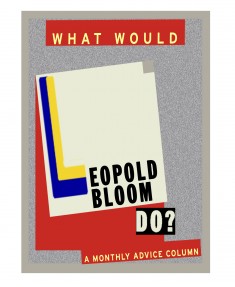December 1, 2015
What Would Leopold Bloom Do?
Volume 3
by Josh Cook
 Complex and confusing, filled with words you don’t know and people you don’t understand, life is even more difficult to navigate than Ulysses. But luckily, we have Ulysses to help us!
Complex and confusing, filled with words you don’t know and people you don’t understand, life is even more difficult to navigate than Ulysses. But luckily, we have Ulysses to help us!
Why shouldn’t we be able to apply our reading efforts to our living efforts? Expansive, generous, humanist, funny, and, of course, difficult, Ulysses can provide answers to the questions kicked up like so much dust as we traverse our day.
Ask your questions, pose your problems, present your challenges, and Josh Cook, author of An Exaggerated Murder and resident Joyce expert, will dispense advice drawn from Joyce’s masterpiece. Just like Ulysses the advice will be serious, silly, and, of course, dirty as required, but always thoughtful and honest. You can send your inquiries to Josh at [email protected]!
Here’s our next question.
Gabler or not Gabler? —Envious of Editions, In An Actual Ivory Tower, Iowa
I skipped this question in the first two editions of this column because it feels like inside baseball (which now that I write that, the term “inside baseball” might, itself, be inside baseball), but the more I thought about it, the more I saw how it connects to important, even fundamental, questions of reading and literature.
A quick summary of what “Gabler or not Gabler” could possibly mean: Ulysses is a copy-editor’s nightmare and a printer’s incepted Freddy Kruger in a copy-editor’s nightmare. No one involved with its initial production was ready to print it, and so hundreds, perhaps even thousands, of errors were created when it was set for printing or just missed by the various editors. Joyce immediately started making corrections, but no amount of corrections would turn Ulysses into a book printers at the time could handle and so as many new mistakes were created as were fixed.
Critic Hans Walter Gabler tried to create a “corrected” edition of Ulysses using a range of different sources and texts. Some scholars believe he succeeded. Others that he made it worse by trying to fix it. In some ways, to Gabler or not to Gabler is one of the most important lingering questions of reading Ulysses.
Obviously, I’m going to answer this question by talking about Shakespeare. There were no definitive editions of Shakespeare’s plays published in his time. The plays differed, sometimes subtly, sometimes dramatically, depending on whether it was in the First Folio or the Second Quarto or whatever. A word here and there or dozens or even hundreds of lines included or excluded. This textual chaos hasn’t diminished Shakespeare’s stature. Nor does it really get in the way of our interpretations of Shakespeare or of his work’s value.
As a culture, over time, we have decided that Shakespeare’s plays have literary value and so we find literary value in them no matter which version or amalgamation of versions we happen to read. To put this in very odd terms, Shakespeare’s words are so powerful, Shakespeare’s words are irrelevant. One of the phrases normally used to identify Stephen Dedalus as a pedantic twat blossom, is “A man of genius makes no mistakes” and in the moment, it’s hard to read the line as anything other than typical, boring, reductive, Great Man Worship.
But there’s another way to read it. Once an artist has proved her genius, we are able to see genius in everything she does, even her mistakes. Because we are reading with the assumption that we are interacting with a genius, a typo becomes a neologism, a grammatical error becomes a bold phrasing, and a forgotten word becomes an original metaphor. When we believe in a book, we supply any absent genius. We too often forget that the experience of a book is a team effort and that the greatest books are great because they provide something that inspires readers to seek meaning far beyond anything the author could intend.
So to Gabler of not to Gabler? Ulysses is so perfect it doesn’t need to be perfect. It doesn’t matter whether you read Gabler, non-Gabler “corrected,” or one of the 1922 (public domain) “uncorrected” editions. There is enough genius in Ulysses that the mistakes are subsumed. Pick up whatever copy is at the bookstore or the library and start reading.
Josh Cook is a bookseller at Porter Square Books. His first novel, An Exaggerated Murder, was published by Melville House in March 2015.